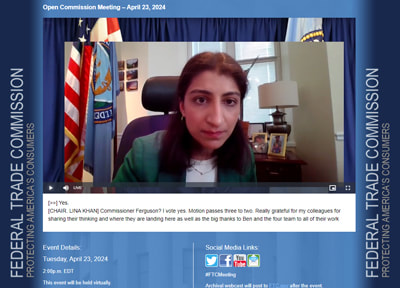|
Legal Alert from Attorney Bob
Litigation challenging the FTC’s authority to implement this ban through rule-making is likely underway. In the meantime, unless and until the Final Rule is stayed, here's what employers need to know about the new regulations concerning non-compete agreements: BackgroundFor years, non-compete clauses have been a staple in employment contracts, intended to protect businesses by restricting the ability of employees to enter into competition against their employers post-employment. However, these clauses have increasingly been criticized for stifling workers' ability to move freely between job opportunities and for depressing wages and innovation. In response, the FTC proposed a rule to eliminate non-compete clauses, prompting over 26,000 public comments, largely in support of the change. After thorough review, the FTC moved to formally ban these agreements with certain nuanced considerations for existing contracts and specific worker categories. Details of the FTC's Final RuleExisting Non-Compete Agreements
Prohibition of New Non-Competes
Exclusions for Non-Profits
Strategic Implications for Businesses Businesses must now reassess their employment strategies and prepare for adjustments in how they manage human resources, protect business secrets, and comply with the new regulations. Organizations should:
Legal ChallengesWithin a few hours of the Final Rule's passage, it was challenged in Federal Court (Ryan, LLC v. Federal Trade Commission). Ryan, LLC has filed a lawsuit in the Northern District of Texas challenging the Federal Trade Commission's (FTC) recently finalized rule that prohibits nearly all non-compete agreements across the United States. The complaint, filed on April 23, 2024, argues that the FTC has overstepped its statutory authority and violated constitutional limits by issuing a rule that effectively invalidates 30 million employment contracts and overrides the regulatory regimes of at least 46 states. Key Points from the Lawsuit
Significance of This Lawsuit This legal challenge is significant as it tests the boundaries of the FTC’s rule-making authority and raises fundamental questions about the balance of federal regulatory power and state-level contract law. A decision in this case could have wide-reaching implications for employment law and corporate governance across the country. Businesses should closely monitor the progress of this case, as its outcome could impact the enforceability of non-compete agreements and potentially reshape the regulatory landscape for employment contracts nationwide. ConclusionThe FTC’s Final Rule on non-compete agreements marks a significant shift in how employers and employees will approach employment contracts and mobility. This change underscores the importance of innovation and competition in the labor market. As always, our firm is here to help navigate these changes with strategic advice and comprehensive compliance support. Please contact us to discuss how this new ruling may impact your business and to update your employment practices accordingly. Note: This alert is not legal advice. It provides an overview of the law’s key components, but there are other nuanced areas of the law that may apply to your business. For additional information, visit the FTC’s press release here. About Attorney Bob
At NextGen Legal, we're transforming the traditional law firm model. Bob’s extensive experience in labor and employment law has been instrumental in shaping a service that offers both day-to-day legal counsel and rapid response for emergent issues. We strive to empower our clients with the knowledge and strategies necessary to navigate the legal landscape effectively and make confident employment decisions, without the fear of unexpected costs. Rated a Rising Star by SuperLawyers (an accolade reserved for only 2.5% of attorneys in Wisconsin), Bob provides strategic legal advice and counsel to companies of all sizes, helping business leaders make confident, informed decisions. His expertise spans employment law, regulatory compliance, litigation, safety, corporate strategy, and risk mitigation. Bob excels in transforming complex legal challenges into clear, actionable business solutions, offering strategic guidance to leadership teams. Disclaimer: Please note that the information provided above is for informational purposes only and should not be construed as legal advice on any subject matter and the scenarios presented in "At Your Service with Attorney Bob" are based on hypothetical fact patterns. The responses provided are for informational purposes only and should not be construed as legal advice on any subject matter. No recipients of content from this column, clients or otherwise, should act or refrain from acting on the basis of any content included in the column without seeking the appropriate legal or other professional advice on the particular facts and circumstances at issue from an attorney licensed in the recipient’s state. The content of "At Your Service with Attorney Bob" and "Legal Alerts from Attorney Bob" contains general information and may not reflect current or subsequent legal developments, verdicts, or settlements. This content is not intended to create, and receipt or viewing does not constitute, an attorney-client relationship. Readers of this column are encouraged to seek out their own legal counsel for any specific legal concerns they may have. Alternatively, readers may reach out to Attorney Bob at NextGen Legal for specific legal guidance tailored to their unique situation. Contact information is as follows: Email: [email protected] Website: www.nextgenlegalsc.com We welcome your inquiries but urge you to make informed decisions regarding legal matters.
0 Comments
Your comment will be posted after it is approved.
Leave a Reply. |
ArchivesCategories |




